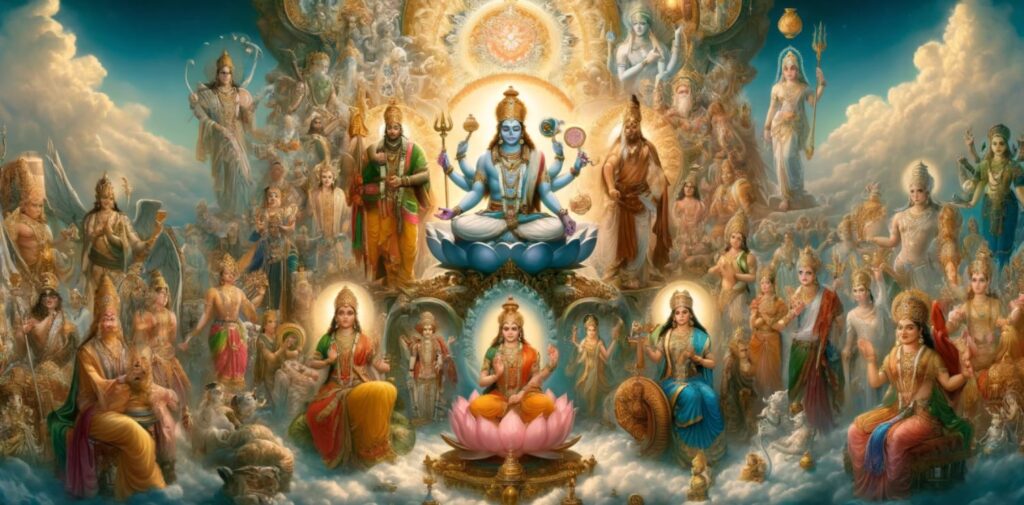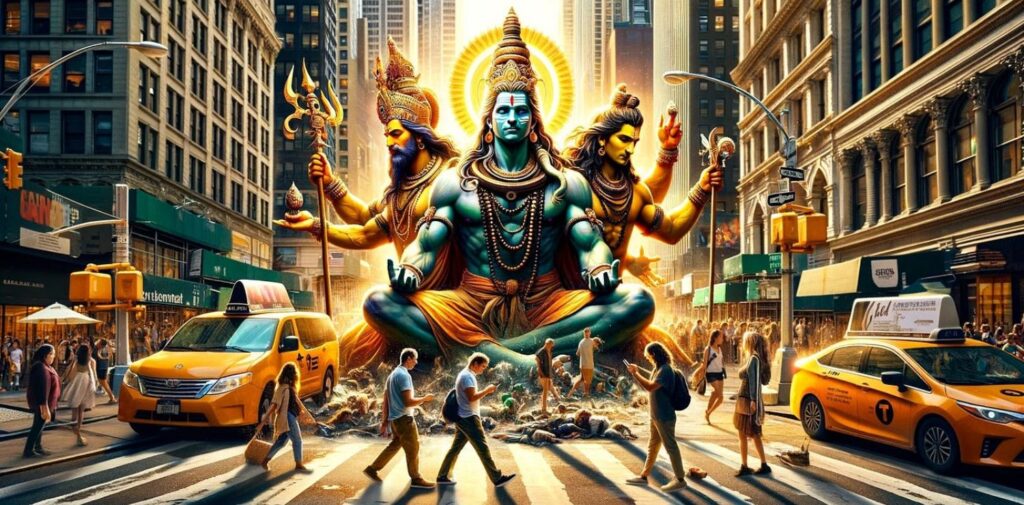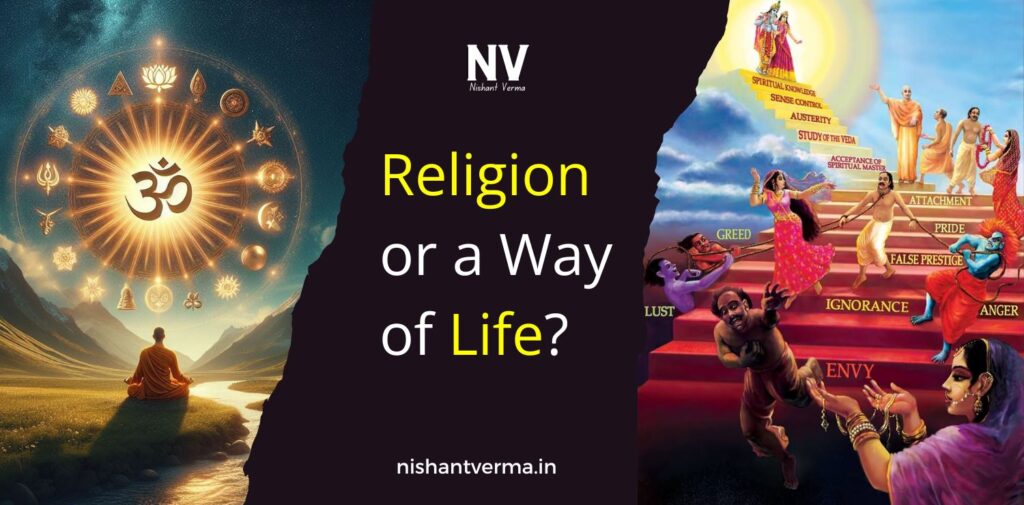Hinduism is one of the oldest and most diverse religions in the world. Over time, it has been described not only as a religion but also as a way of life. This raises an important question: is Hinduism a religion or a way of life? To answer this, we need to understand both concepts and explore how they relate to Hinduism. Let’s take a closer look at both perspectives without rushing to a conclusion.
What is a Religion?
To begin, let’s think about what we mean by “religion.” A religion typically refers to a set of beliefs, practices, and rituals that centre around a higher power or divine force. Religions often provide answers to big questions about life, death, and the nature of existence. Most religions also involve community worship, moral codes, sacred texts, and prayers.
For many people, being religious means adhering to certain teachings or doctrines, participating in specific rituals, and following a particular set of moral guidelines. In this sense, Hinduism could be seen as a religion because it includes a belief in gods, sacred scriptures like the Vedas and the Bhagavad Gita, and various rituals and practices such as prayer, meditation, and festivals.

What is a Way of Life?
On the other hand, the idea of a “way of life” is broader and more flexible. A way of life refers to the way people live their daily lives, the values they uphold, the choices they make, and the behaviours they practice. It includes cultural practices, social interactions, and personal philosophies.
When people describe Hinduism as a “way of life,” they are often referring to how it influences all aspects of a person’s life—not just spiritual practices but also how they interact with others, handle their work, and approach their personal growth and ethics.
For example, Hindu values such as non-violence (Ahimsa), truthfulness (Satya), respect for elders, and the importance of family and community are all part of how people live their lives. These principles are deeply embedded in everyday actions, from how a person behaves at home to how they interact in society.
Hinduism: A Religion of Many Gods and Beliefs
One of the defining features of Hinduism as a religion is its belief in many gods and goddesses. The religion is not centred around one god but has a vast array of divine figures, each representing different aspects of life and the universe. Some of the most famous deities include Vishnu, Shiva, Lakshmi, Saraswati, and Durga.
Hinduism has a rich mythology and many sacred texts, like the Vedas (ancient hymns), the Upanishads (philosophical teachings), and the Mahabharata (an epic poem that includes the Bhagavad Gita). These texts offer teachings about the nature of the universe, the self, and the divine. They also guide individuals on how to live a virtuous life, fulfil their duties (dharma), and strive for liberation (moksha).
The focus on devotion to the gods (bhakti) and the pursuit of knowledge (jnana) are central aspects of Hindu religious practice. Temples, pilgrimages, festivals, and rituals are integral to the practice of Hinduism as a religion. These practices offer a way for followers to connect with the divine and participate in a community of believers.

Hinduism: A Way of Life That Extends Beyond Rituals
At the same time, Hinduism’s influence stretches far beyond religious rituals. In India and other places where Hinduism is practised, it impacts every aspect of life—what people eat, how they dress, how they relate to family and community, and how they view the environment.
For example, the concept of karma teaches that the actions we take today will affect our future, in this life and the next. This idea influences how Hindus approach their work, their relationships, and their personal growth. They are encouraged to live in harmony with the world and others, making choices that align with dharma (moral duty) and that contribute to a positive balance in the universe.
Ahimsa, or non-violence, is another key principle that extends far beyond the temple. It affects how Hindus treat animals, how they approach conflicts, and how they strive to live peacefully with others. Many Hindus are vegetarian as a result of this belief in non-harm.
Hinduism’s focus on yoga and meditation also demonstrates its role as a way of life. These practices are not just spiritual activities; they are physical and mental exercises that can improve overall well-being. Many people, even outside of religious contexts, practice yoga to stay healthy, relieve stress, and find inner peace. The same is true for meditation, which is used to enhance concentration, reduce anxiety, and promote mindfulness.
Hindu Ethics and Social Life
Hinduism’s teachings on ethics play a significant role in guiding how people interact with one another. The concepts of dharma (righteous duty), karma (action and its consequences), and ahimsa (non-violence) shape how individuals approach their social roles and responsibilities.
In Hindu society, family and community are highly valued. Varna (the caste system) and ashrama (the stages of life) offer a framework for organizing social and personal duties. Each person has a particular role or duty in society—whether as a student, a parent, or a teacher. These roles guide individuals toward fulfilling their responsibilities, which contributes to social harmony.
Hinduism also emphasizes the importance of seva (selfless service), where individuals are encouraged to help others without expecting anything in return. This promotes a sense of interconnectedness and compassion within the community.
The Flexibility of Hinduism
Unlike many Western religions that are organized around a fixed set of beliefs and practices, Hinduism is incredibly diverse. It allows for a wide range of interpretations and practices. One person may focus on worshipping a particular deity, while another might prioritize meditation or studying philosophical texts. Some may adhere to specific rituals, while others may approach Hinduism more philosophically or personally.
This flexibility makes Hinduism not only a religion but a way of life that can adapt to the needs of individuals and communities. It allows people to choose their spiritual path and live according to their understanding of the world and their relationship to the divine.

Hinduism and Modern Life
In the modern world, Hinduism continues to evolve. It interacts with different cultures and philosophies and addresses new challenges, such as environmental concerns, social justice, and the role of women in society. Many Hindus today balance their traditional religious practices with modern education, career goals, and global perspectives.
For some, Hinduism remains deeply rooted in ancient rituals and practices. For others, it is a spiritual philosophy that guides their thoughts and actions. Yet, regardless of how it is practised, Hinduism continues to provide a framework for living a meaningful and ethical life.
Conclusion: Hinduism a Religion or a Way of Life?
As we have seen, Hinduism can be both a religion and a way of life, depending on how it is understood and practised. For some, it is a set of religious beliefs and rituals that help them connect to the divine and guide their spiritual journey. For others, it is a broader philosophy that shapes their everyday life, influences their ethical choices, and provides a sense of purpose.
The richness and diversity of Hinduism allow for a variety of interpretations, and this is why it is difficult to categorize it in just one way. Hinduism’s philosophical scope is vast, and it offers something for everyone—whether they are seeking spiritual growth, ethical guidance, or a deeper understanding of the world around them.
Ultimately, the question of whether Hinduism is a religion or a way of life may depend on who you ask. What is clear, however, is that it offers a path for individuals to explore their spiritual, ethical, and social lives in a meaningful and integrated way.




